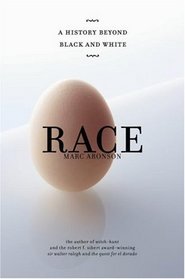Reviewed by Me for TeensReadToo.com
When the Declaration of Independence was signed on July 4, 1776, the members of the General Congress of the then thirteen United States of America declared: "We hold these truths to be self-evident, that all men are created equal..."
Did they mean it? Does anyone who says it now, that "all men are created equal," really mean it? Exactly what importance does race play in how we are treated, in how we are perceived, and in how we treat and perceive others? What, exactly, is race to begin with?
Is race defined by the color of our skin? Are we White or Black, Hispanic or Asian, Indian or Arabic? Or is race based on where our ancestors originated from? Are we Greek or Roman, Polish or European? Or, in fact, is race based on our religious beliefs? Are we Christian, Muslim, Jewish?
Marc Aronson has no clear-cut answers, and neither does science or history. The true fact of the matter is that race is a belief, and everyone believes differently. Just as racial prejudice is a learned mindset, so is how we view race. There have always been, and probably always will be, those human beings who see other humans as inferior. Although we can hope that one day prejudice will be a thing of the past, I don't think that anyone, when being completely honest with themselves, hasn't fallen victim at least once to being prejudicial to another person based on some idea of race.
RACE is a fascinating look into the history of the human belief system as regards to the teachings of race in all of its disguises, whether the color of our skin, our ethnic background, or our religion. It's a great learning tool that would be well used in classrooms or as independent study for anyone who wishes to study the matter further.
When the Declaration of Independence was signed on July 4, 1776, the members of the General Congress of the then thirteen United States of America declared: "We hold these truths to be self-evident, that all men are created equal..."
Did they mean it? Does anyone who says it now, that "all men are created equal," really mean it? Exactly what importance does race play in how we are treated, in how we are perceived, and in how we treat and perceive others? What, exactly, is race to begin with?
Is race defined by the color of our skin? Are we White or Black, Hispanic or Asian, Indian or Arabic? Or is race based on where our ancestors originated from? Are we Greek or Roman, Polish or European? Or, in fact, is race based on our religious beliefs? Are we Christian, Muslim, Jewish?
Marc Aronson has no clear-cut answers, and neither does science or history. The true fact of the matter is that race is a belief, and everyone believes differently. Just as racial prejudice is a learned mindset, so is how we view race. There have always been, and probably always will be, those human beings who see other humans as inferior. Although we can hope that one day prejudice will be a thing of the past, I don't think that anyone, when being completely honest with themselves, hasn't fallen victim at least once to being prejudicial to another person based on some idea of race.
RACE is a fascinating look into the history of the human belief system as regards to the teachings of race in all of its disguises, whether the color of our skin, our ethnic background, or our religion. It's a great learning tool that would be well used in classrooms or as independent study for anyone who wishes to study the matter further.




![header=[] body=[Get a free book credit right now by joining the club and listing 5 books you have and are willing to share with other members!] Help icon](/images/question.gif?v=52444873)
